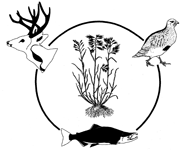Extension Wildlife & Fisheries Specialists Conferences

Triennial National Wildlife and Fisheries Extension Specialists Conference: 8th (1996)
Date of this Version
June 1996
Document Type
Article
Abstract
The Wetlands for Wisconsin Project is a comprehensive, hands-on, educational program on wetlands restoration and management for private landowners and local government staff. This program recruits highly motivated participants to take part in a 2-day workshop and become "Wetland Cooperators." At the workshop presenters instruct sessions both indoors and at field sites to demonstrate the value of wetlands and to show how wetland restoration and management techniques work. We provide each participant with a binder of pertinent wetland publications, and we pay for their meals and lodging during the workshop. In return, the wetland cooperators agree to implement a sound wetland restoration or management plan and reach out to other landowners with the message of wise wetland stewardship. The government staff cooperators are not expected to implement a wetland stewardship plan, but are responsible for reaching other potential wetland owners. In essence, we recruit people to be our ambassadors of sound wetland management and restoration.
Landowners and local government staff members were selected from applications received from citizens in targeted counties. By empowering those community members who value wetlands, we can begin a grassroots campaign to restore and manage the state's wetlands responsibly. We provide wetland cooperators with the knowledge, resources, and support to implement restoration and management on their property, and they in turn demonstrate to others the personal and societal benefits of wetlands. This project made it possible to impact nearly 1,000 acres directly, and more than 5,000 acres through the efforts of our volunteer wetland cooperators. We hope to expand this effort to more counties in the future.


Comments
Published in W. Daniel Edge, ed. Proceedings of the 8th National Extension Wildlife and Fisheries Specialists Workshop: Educational Challenges for the 21st Century. [1996] Corvallis, Oregon: Oregon State University, 1998.